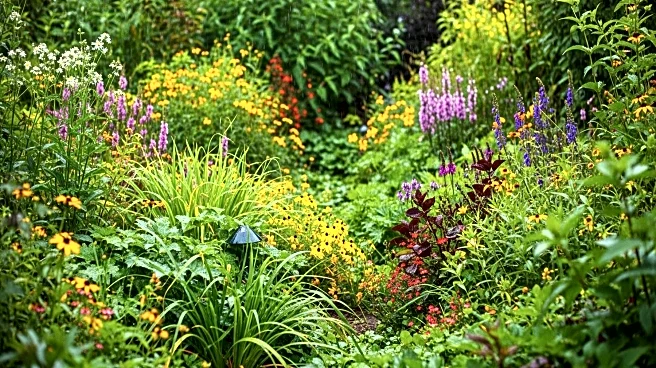What's Happening?
The city of Brighton is addressing the issue of toxic road runoff through an innovative nature-based project known as the Wild Park rainscape. This initiative, developed over six years, involves a vegetated swale and four planted basins designed to filter pollutants from road runoff before they seep into the city's chalk aquifer. The project, funded by National Highways and supported by Brighton and Hove city council, aims to prevent contaminants such as microplastics and chemicals from entering the water supply. The rainscape will treat water from a 2.5-mile stretch of the A27, using a series of filtration stages to remove particulates and contaminants. This approach is part of a broader effort to manage stormwater and reduce reliance on chemical water treatments.
Why It's Important?
The Wild Park rainscape project is significant as it addresses the growing environmental challenge of road runoff, which is exacerbated by climate change and increased rainfall. By filtering pollutants naturally, the project reduces the risk of harmful chemicals entering the water supply, thus protecting public health and the environment. This initiative also serves as a model for other cities facing similar challenges, demonstrating the effectiveness of green infrastructure in managing urban water issues. The project not only aims to improve water quality but also enhances local biodiversity and provides recreational spaces for the community, contributing to social and environmental well-being.
What's Next?
The success of the Wild Park rainscape will be monitored by researchers from the University of Brighton, who will collect data on its performance. This information will be shared with other councils to encourage the adoption of similar nature-based solutions. The project is expected to inspire further developments in green infrastructure, both locally and globally, as cities seek sustainable ways to manage stormwater and protect water resources. Additionally, educational programs are being implemented to raise awareness about water pollution and the benefits of nature-based solutions among local schools and communities.
Beyond the Headlines
The Wild Park rainscape highlights the potential for integrating nature-based solutions into urban planning to address environmental challenges. This approach not only mitigates pollution but also fosters community engagement and education, promoting a deeper understanding of environmental stewardship. The project underscores the importance of collaboration between government agencies, educational institutions, and local communities in developing sustainable solutions to complex environmental issues.











